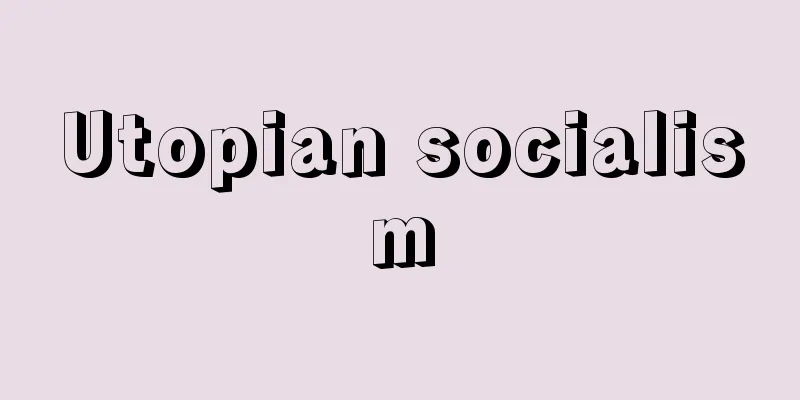Utopian socialism

|
A type of socialism that Engels named in contrast to scientific socialism (Marxism). The utopian ideas of Thomas More, who published a book titled Utopia in 1516, which corresponds to the adjective utopian, and Campanella, who published The City of the Sun in 1623, are characterized by their detailed and imaginary depictions of imaginary ideal societies that do not exist anywhere. However, the imaginary nature of utopian socialism mentioned here does not only lie in this point. Socialist ideas that are not simply imaginary descriptions of ideal societies, but also start from an analysis of the society in question, can be imaginary. It is undeniable that there is a commonality between Utopia and The City of the Sun, through the socialist ideas of the 17th and 18th centuries, and those of the mid-19th century. That is the same goal of creating a new society where there are no poor or rich, where humans are happy, and where there is no exploitation of humans. However, the content of ideas and the forms of their expression are diverse. In addition to the descriptions of imaginary ideal societies mentioned above, there are the following forms: theoretical treatises on ideal societies (Morelli, Deschamps, etc.), plans for new societies (Owen, Saint-Simon, etc.), and plans and methods for building these societies (Blanc, Pecourt, etc.). The content of their works has also developed and diversified. The utopian socialists of the late 18th century Enlightenment, such as Morelli and Mavri, not only rejected the fantasies of More-Campanella, but actually created utopias using the materials of their own time and country. The difference between the utopianism of the 19th century and that of the present is as follows: before, social ideals were given an abstract and speculative character, they were placed outside of time, and their eternal usefulness and absolute truth were emphasized. In the 19th century, social ideals were developed starting from a critical study of the society surrounding them, taking into account historical factors. They no longer started from an abstract and intuitive perception of reality, but from an analysis of the social relations of the time and a criticism of capitalist society. For them, social ideals were the result of the development of human society over the past several centuries. The utopians of the previous century, on the other hand, were distinguished by a lack of a sense of history. The establishment of capitalism imprints a new character on utopian theories. Disappointed by the real achievements of reason, which the Enlightenment philosophers had celebrated, they undoubtedly wish to be integrated into the framework of a rational and scientific society. Science, at the service of humanity, should enable man to reach a state of abundance that would free him from unnecessary work and allow him to freely develop his faculties. The utopian socialists who preceded the emergence of scientific socialism were found to have a critical attitude towards utopia and a faith in scientific knowledge. Fourier criticized theories that presented the dream of a more just society without pointing out the means to realize it, and Owen called all his predecessors from Plato to Fourier utopians because they "did not understand the principles on which human society rests." Saint-Simon was a believer in positive science. This was the era when socialism was changing from utopia to science. In Plekhanov's apt expression, it was "utopianism that rejected utopia and sought science." Marx wrote in a letter in 1865 that, "Instead of considering science in a critical awareness of the historical movement, which itself produces the material conditions of emancipation, he (Proudhon), being such an utopianist, begins to look for what are called 'sciences' in order to derive a priori formulas for the 'solution of social problems.'" He also wrote that the "theorists of utopian socialism are nothing more than utopians who invent makeshift systems to prepare for and answer the needs of the oppressed classes, and who seek a science to regenerate society" (The Poverty of Philosophy). Engels considers both Proudhon and the British Ricardian socialist Gray to be utopians, even though they do not give a detailed outline of the organization of an ideal society (Engels' preface to the first German edition of The Poverty of Philosophy). For Marx and Engels, the term utopia goes beyond the semantic content established by More's work. Saint-Simon, Fourier and Owen are defined by Engels as the "three great utopian socialists", but this utopianism did not end with Owen: "The ideas of the utopian socialists dominated socialist thinking in the 19th century for a long time, and in part still do so" (From Utopia to Science). Utopian socialism is a socialism at a stage when the proletariat is immature as a class, the struggle with the bourgeoisie has not yet taken on a political character, and productive forces are not yet sufficiently developed to create the material conditions necessary for the formation of a new society. It merely opposes a system of truth, reason, and justice invented in one's head to the contradictions in real society, does not recognize the historical inevitability of the development of society from capitalism to socialism and communism, and does not understand the significance of class struggle in realizing its ideals, instead relying on the goodwill of the ruling class and the wealthy. This is why it is called utopian. In contrast, as history progresses and the struggle of the proletariat takes on clearer contours, socialists "no longer need to search for science (an ideal system) with their own minds," and "they need only understand and become organs of what is happening before their eyes," at which point "science, fully aware of its causes and connected with historical movements, ceases to be theoretical and becomes revolutionary" (The Poverty of Philosophy). This is the position of scientific socialism, which is a movement rather than a doctrine, and which starts from facts rather than principles. [Eizaburo Koga] "From Utopia to Science" by Engels, translated by Ouchi Hyoe (Iwanami Bunko)" ▽ "From Utopia to Science" by Engels, translated by Terasawa Tsunenobu (Otsuki Shoten, National Library)" [Reference items] | |Source: Shogakukan Encyclopedia Nipponica About Encyclopedia Nipponica Information | Legend |
|
エンゲルスが科学的社会主義(マルクス主義)に対比して名づけた社会主義の種類。「空想的」という形容詞ユートピアンに対応する名詞『ユートピア』を題名とする著書を1516年に刊行したトマス・モアや、1623年に『太陽の都』を発表したカンパネッラなどのユートピア思想は、どこにもない架空の理想社会を詳細に空想的に描くという性格をもっている。だがここにいう空想的社会主義の空想性は、そういう点にのみあるのではない。理想社会の単に架空の記述でなく、当該社会の分析から出発した社会主義思想でも空想的たりうる。『ユートピア』や『太陽の都』から17、18世紀の社会主義諸思想を経て19世紀なかばのそれに至るまで、ある共通点があることは否めない。それは、貧者も富者も存在しない、人間が幸福な、人間の搾取のない新しい社会の創出という目標の同一性である。 だが思想の内容、その表現形態は多様である。先の架空の理想社会の記述のほかに、次のような形態がある。理想社会に関する理論的な論説(モレリ、デシャンなど)、新しい社会のプラン(オーエン、サン・シモンなど)、この社会の建設のための企画と手段(ブラン、ペクールなど)がそれである。 内容も発展し多様である。モレリ、マブリらの18世紀後半の啓蒙(けいもう)主義時代の空想的社会主義者は、モア‐カンパネッラ風の空想小説を退けているだけでなく、実際には自分の時代と国の材料をもってユートピアをつくったのである。19世紀以前と以後との相違は次の点にある。以前には社会的理想に抽象的思弁的性格を授け、それを時間の外にたて、それの永久的な効用と絶対的真理とを特筆する。19世紀に入ると、歴史的要因を考慮に入れながら、彼らを取り巻く社会の批判的研究から出発して社会的理想を仕上げる。彼らはもはや現実についての抽象的、直観的な知覚から出発するのではなく、その時代の社会関係の分析から、資本主義社会の批判から出発する。彼らにとって社会的理想は、数世紀来の人間社会の発達の結果なのである。それ以前の空想主義者は反対に歴史感覚の欠如によって区別される。 資本主義の確立が空想理論に新しい性格を刻印する。啓蒙哲学者が祝福した理性の実際の成果に失望させられた彼らは、間違いなく合理的で科学的な社会の枠組みのなかに統合されることを願う。人類に仕える科学は、人間を不必要な仕事から解放し、自由に自分の能力を発展させることを可能にする富裕な状態に達することを可能にするはずである。 科学的社会主義の出現に先だつ時期の空想的社会主義者には、ユートピアに対する批判的態度と科学の知識への信頼とがみいだされる。フーリエは、実現するための手段を指摘することなく、より正当な社会の夢想を示す理論を批判していたし、オーエンは、プラトンからフーリエに至るすべての先行者を、「人間社会がよって立つ原理を識(し)らぬ」ゆえに空想主義者と名づけた。サン・シモンは実証科学の信奉者であった。この時代はまさに社会主義が空想から科学へ変わろうとしていた時代であった。プレハーノフのうまい表現によれば、「ユートピアを否定し科学を求めている空想主義」であった。 マルクスは1865年の書簡のなかで書いている。「かかる空想主義者である彼(プルードン)は、歴史の運動――この運動それ自体が解放の物質的諸条件を生み出すのだが――の批判的認識のなかで科学を考えるかわりに、〈社会問題の解決〉のためのア・プリオリな定式をそこから引き出すために、いわゆる〈科学〉を探し始める」と。また空想的社会主義の「理論家たちは、被抑圧階級の欲求に備えてそれにこたえるため、もろもろの体系を一時のまにあわせにつくり、社会を再生させる科学を追求する空想家であるにすぎない」(『哲学の貧困』)とも書いている。 エンゲルスは、プルードンもイギリスのリカード派社会主義者グレーも、彼らは理想社会の組織を詳細に描くことをしていないが、空想主義者とみなしている(『哲学の貧困』ドイツ語初版へのエンゲルスの序文)。ユートピアという語は、マルクスとエンゲルスにとっては、モアの作品により規定された語義上の内容を超えている。サン・シモン、フーリエ、オーエンは、エンゲルスによって「3人の偉大なユートピア社会主義者」と規定されたが、この空想主義はオーエンで終わらなかった。「ユートピア社会主義者たちの考え方は、19世紀の社会主義的観念を長い間支配してきたし、部分的にはいまでも支配している」(『空想より科学へ』)。空想的社会主義は、プロレタリアートが階級として未熟で、ブルジョアジーとの闘争がまだ政治的性格を帯びておらず、生産諸力が新しい社会の形成に不可欠の物質的諸条件をつくりだすほど十分に発達していない段階の社会主義で、現実の社会の矛盾に対して、頭のなかからひねりだされた真理、理性、正義の体系を対置するだけで、資本主義から社会主義・共産主義への社会発展の歴史的必然性の認識がなく、しかも理想の実現について階級闘争の意義を理解せず、支配階級や金持ちの善意に期待する。これが空想的といわれるゆえんである。 これに対して、歴史が前進し、プロレタリアートの闘争がより鮮明な輪郭を示すようになると、社会主義者は、「彼ら自身の頭で科学(理想の体系)を探求することは必要でなくなり」、「彼らは彼らの目の前で起こることを了解しその器官となりさえすればよく」、そのとき「完全に原因を自覚して歴史的運動と結合した科学は、空理空論的なものであることをやめて革命的なものとなる」(『哲学の貧困』)。これが科学的社会主義の立場で、それは教義ではなく運動であり、原理からでなく事実から出発する。 [古賀英三郎] 『エンゲルス著、大内兵衛訳『空想より科学へ』(岩波文庫)』▽『エンゲルス著、寺沢恒信訳『空想から科学へ』(大月書店・国民文庫)』 [参照項目] | |出典 小学館 日本大百科全書(ニッポニカ)日本大百科全書(ニッポニカ)について 情報 | 凡例 |
<<: Air refueling - air refueling
>>: Idol worship - idol worship
Recommend
tuberculous pyothorax
…It begins as an acute empyema, which can progres...
Single-lens reflex camera - Single-lens reflex camera
A reflex camera in which the taking lens also serv...
Port of Kitakyushu
A port in Fukuoka Prefecture. Located at the north...
Kojiki and Nihonshoki myths
According to Ishimoda Tadashi, these heroic myths...
Inton Hyakushomura - Reclusive Farmer's Village
...It can also refer to settlements that farmers ...
Pilonidal sinus
Also called pilonidal fistula. A chronic, purulent...
Ulster
…(f) A tielocken, a double-breasted garment witho...
Ekman spiral - Ekman spiral
…On the ocean surface, the ocean current flows 45...
Beast - beast
〘 noun 〙① A mammal with four legs and hair all ove...
Lotella
…A general term for marine fish of the Moridae fa...
"Old Book of the Past" - Golden Book
…It is also called the “Records of Ancient Times....
Jigga
The oldest Chinese dictionary. Author unknown. It...
latent fetal distress
...Continuous recordings of fetal movement and fe...
King's College
…One of the Ivy League. The fifth oldest in the U...
Collar - Erimaki
It is a clothing accessory worn by men and women ...


![Palawan [island] - Palawan](/upload/images/67cc9012c15d0.webp)






